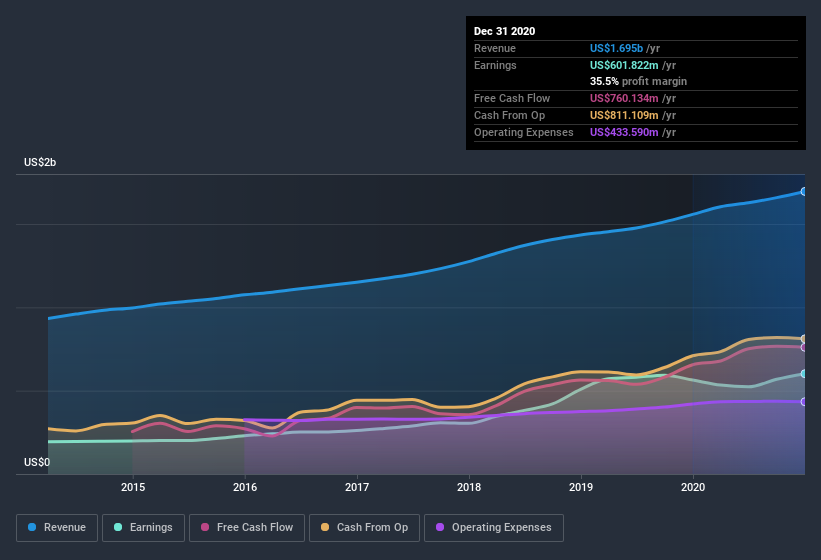With EPS Growth And More, MSCI (NYSE:MSCI) Is Interesting
Some have more dollars than sense, they say, so even companies that have no revenue, no profit, and a record of falling short, can easily find investors. Unfortunately, high risk investments often have little probability of ever paying off, and many investors pay a price to learn their lesson.
In contrast to all that, I prefer to spend time on companies like MSCI (NYSE:MSCI), which has not only revenues, but also profits. Even if the shares are fully valued today, most capitalists would recognize its profits as the demonstration of steady value generation. Conversely, a loss-making company is yet to prove itself with profit, and eventually the sweet milk of external capital may run sour.
See our latest analysis for MSCI
How Fast Is MSCI Growing?
If a company can keep growing earnings per share (EPS) long enough, its share price will eventually follow. Therefore, there are plenty of investors who like to buy shares in companies that are growing EPS. It certainly is nice to see that MSCI has managed to grow EPS by 29% per year over three years. So it's not surprising to see the company trades on a very high multiple of (past) earnings.
I like to take a look at earnings before interest and (EBIT) tax margins, as well as revenue growth, to get another take on the quality of the company's growth. The good news is that MSCI is growing revenues, and EBIT margins improved by 3.6 percentage points to 52%, over the last year. That's great to see, on both counts.
You can take a look at the company's revenue and earnings growth trend, in the chart below. To see the actual numbers, click on the chart.
Of course the knack is to find stocks that have their best days in the future, not in the past. You could base your opinion on past performance, of course, but you may also want to check this interactive graph of professional analyst EPS forecasts for MSCI.
Are MSCI Insiders Aligned With All Shareholders?
We would not expect to see insiders owning a large percentage of a US$35b company like MSCI. But we are reassured by the fact they have invested in the company. Indeed, they have a glittering mountain of wealth invested in it, currently valued at US$1.0b. This suggests to me that leadership will be very mindful of shareholders' interests when making decisions!
Should You Add MSCI To Your Watchlist?
For growth investors like me, MSCI's raw rate of earnings growth is a beacon in the night. I think that EPS growth is something to boast of, and it doesn't surprise me that insiders are holding on to a considerable chunk of shares. So this is very likely the kind of business that I like to spend time researching, with a view to discerning its true value. We should say that we've discovered 2 warning signs for MSCI that you should be aware of before investing here.
Of course, you can do well (sometimes) buying stocks that are not growing earnings and do not have insiders buying shares. But as a growth investor I always like to check out companies that do have those features. You can access a free list of them here.
Please note the insider transactions discussed in this article refer to reportable transactions in the relevant jurisdiction.
This article by Simply Wall St is general in nature. It does not constitute a recommendation to buy or sell any stock, and does not take account of your objectives, or your financial situation. We aim to bring you long-term focused analysis driven by fundamental data. Note that our analysis may not factor in the latest price-sensitive company announcements or qualitative material. Simply Wall St has no position in any stocks mentioned.
Have feedback on this article? Concerned about the content? Get in touch with us directly. Alternatively, email editorial-team (at) simplywallst.com.

 Yahoo Finance
Yahoo Finance 
